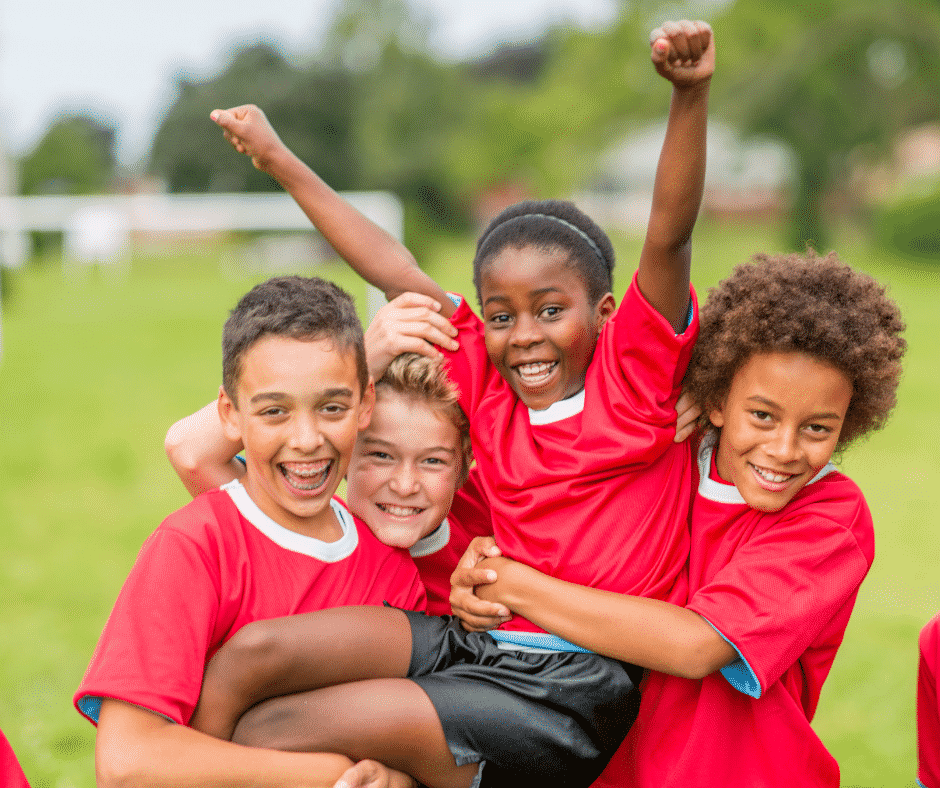Humans are social creatures and we develop our social and emotional skills in infancy and childhood. Children learn from their caregivers and peers to understand who they are, what they feel, and how to interact with others. They learn, grow and become healthy through play, which naturally transitions into sports when they go to school.

Kids who are active dramatically reduce their risk of many diseases such as childhood obesity. Regular exercise is also known to reduce the risk of emotional problems. Habits are established early in life and evidence suggests that physically active children are more likely to mature into physically active adults.
12 benefits of sport for kids:
- Reduced risk of obesity – childhood obesity can lead other chronic illnesses developing. These diseases include asthma, type 2 diabetes, sleep apnea, cholesterol and heart disease.
- Healthy growth and energy levels – their bones, muscles, ligaments and tendons will grow the way they are supposed to and have increased energy levels.
- Improved coordination and balance – also assisting with less injuries
- Ability to physically relax – help avoid the complications of muscular tension (such as headache or back ache)
- Improved sleep – kids need enough daily sleep to allow their developing minds and bodies to recover and grow. They will be well rested to have the energy to do it all again tomorrow. As well as a boosted immune system.
- Mental health benefits – emotional problems such as stress, anxiety and depression are reduced. Builds greater confidence and healthy self-image.
- Improved social skills – learning to empathise and interact with their peers, and form lasting friendships.
- Improved personal skills – including cooperation and leadership. Learn to be part of a team.
- Navigate hardships – learning to accept defeat and cope with rejection.
- Maintain discipline – mental, physical, and tactical discipline is learned. Self-restrain, following rules, and that actions have consequences – good and bad.
- Achieving goals – setting a goal, making a plan, and sticking to what is required to achieve their goals will serve them well in life (sports, school, or career).
- Distraction and fun – their time is spent on productive activities. Less time to spend mindlessly watching TV, on social media, or taking part in juvenile delinquency.
Balance is important. Although physical activity such as sport has great health benefits, no one activity should occupy too much time in a day. The recommended minimum time for physical activity per day is 60 minutes, with the maximum being 3-4 hours depending on age. Children should also get “down time.” The recommended amount of time is 2 hours per day. They may fill this time with computer games, internet use, watching TV, cultural activities such as art or music, socialising with friends or family. Time for homework – this amount of time also varies depending on age, grade level, and amount of work. And most importantly, getting enough sleep.
If you or your child is already struggling with obesity-related illness, injury, or joint and muscle pain, reach out to The Back Clinic. Their therapists specialize in helping patients identify, manage and treat their conditions and pain. Contact them on 063 097 5603 or via email at info@thebackclinic.co.za
Contact Us
Contact us to find out more about treatment at The Back Clinic or with any questions you may have.
